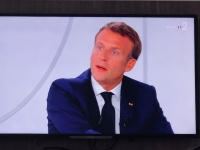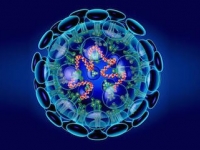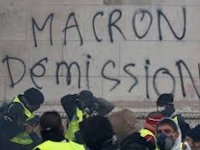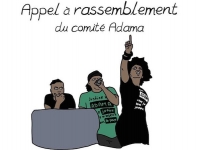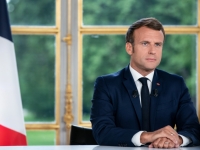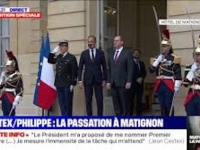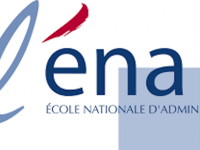Politics
PDT MACRON INTERVIEWED ON TV OVER THE JULY 14 NATIONAL DAY- PART 1
BY LEA SALAME FRCE 2 GILLES BOULEAU TF1
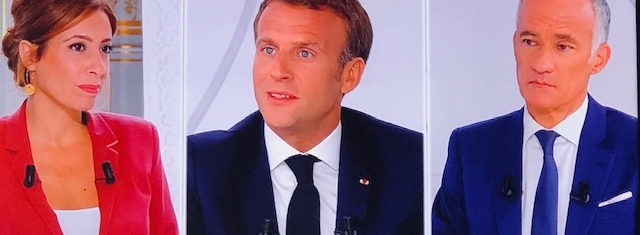
President Macron Itvw Lea Salame Gilles Bouleau (Source: Tf1 France 2 TV Caption)
USPA NEWS -
At the end of the ceremony of July 14, which was this year in a reduced and unprecedented format, by honoring the workers of the confinement period on the first line, the President of the Republic, Emmanuel Macron replied to questions from Lea Salame and Gilles Bouleau journalists respectively from the TV channels, France 2 and TF1. The President fixed a calendar of next actions, for the remaining 600 days of his mandate, as well as for the next 10 years, of the "reinvention » of France post COVID-19. The Head of State explained that putting youth in priority in the exoneration of charges mechanisms for the next, 700,000 to 1 million young people <25 years old freshly graduated and will present themselves on the labor market next spring“¦ The President also announced that the wearing of a mask will soon be mandatory (from August) in confined spaces, in response to recent announcements of "probable second waves" from the health experts and doctors, with regard to the upsurge of new clusters of COVID-19 infection.We are publishing the entire exchange of the interview carried out at the Palais de l'Elysée by political journalists, Lea Salame from France 2 and Gilles Bouleau from Tf1.
PDT MACRON INTERVIEWED ON TV OVER THE JULY 14 NATIONAL DAY- PART 1----------------------------------------
At the end of the ceremony of July 14, which was this year in a reduced and unprecedented format, by honoring the workers of the confinement period on the first line, the President of the Republic, Emmanuel Macron replied to questions from Lea Salame and Gilles Bouleau journalists respectively from the TV channels, France 2 and TF1. The President fixed a calendar of next actions, for the remaining 600 days of his mandate, as well as for the next 10 years, of the "reinvention » of France post COVID-19. The Head of State explained that putting youth in priority in the exoneration of charges mechanisms for the next, 700,000 to 1 million young people <25 years old freshly graduated and will present themselves on the labor market next spring“¦ The President also announced that the wearing of a mask will soon be mandatory (from August) in confined spaces, in response to recent announcements of "probable second waves" from the health experts and doctors, with regard to the upsurge of new clusters of COVID-19 infection.
President Macron also answered the question concerning what he suffered from « The hate against the French President, in particular the Yellow Vests" which he understood and admits having failed to "restore confidence with the French people "And no longer his hope of enforcing" equal opportunities ". These demonstrations of Yellow Vests “They are legitimate, but hatred and brutality are not acceptable. " President Macron confirmed the € 100 billion recovery plan and reassured the French people about "no new tax" to revive the country's economy. The head of state also announced that the pension reform cannot be applied in its "current state" The most tense moment of the interview was when President Macron assumed on the basis of the presumption of innocence towards Gerald Darmanin, the new Minister of the Interior whose appointment created a controversy and feminist protests demanding his resignation because he is the subject of complaints of "sex drive and rape" from a complainant. The President of the Republic also claimed "the right to think big and far" regarding the proposals he made over a very long term (10 years, after his end of mandate). We are publishing the entire exchange of the interview carried out at the Palais de l'Elysée by political journalists, Lea Salame from France 2 and Gilles Bouleau from Tf1. As a repayable of his introduction, the President announced that he appreciates a change "Free open and contradictory and also over the 3 years that have taken place". President Macron then entrusted his emotion with the special ceremony this year celebrating 14 Juliet, French national holiday by honoring the first lines of the period COVID-19, at the cost of the military. “We were moved this morning in front of the caregivers who displayed the French flag with the soldiers. We have to measure its gravity “
PRESIDENT MACRON INTERVIEWED BY LEA SALAME & GILLES BOULEAU- FULL INTERVIEW (Elysee)
LEA SALAME (France 2 TV): Hello everyone and good morning Mr. President.
PRESIDENT MACRON: Hello.
GILLES BOULEAU (TF1 TV): Hello Mr. President. Hello Lea.
PRESIDENT MACRON: Hello everyone.
LEA SALAME (France 2 TV): Hello Gilles. Thank you for welcoming us to the Élysée, here in the village hall. Mr. Speaker, you said when you came to power that you would no longer be interviewing on July 14, that it was over. Why did you change your mind? Why do you want to speak today? Why reconnect with tradition?
PRESIDENT MACRON: To renew would mean that it would be again every July 14, I don't know how to tell you. What I do know is that this July 14th is a bit special and we experienced it this morning with great emotion and pride. It´s July 14 that celebrates our pride in being French, our national holiday, in which we celebrate our armies. We did it again this morning, to which we owe so much, their families, their injured. But this July 14, our armies agreed to offer a little spotlight to the caregivers, to these women and men who for months, as they do throughout the year, but this time especially, protected us, fought for us against this Covid-19. And it is true that we are emerging from this acute phase of the epidemic. We are not rid of it. We will no doubt come back to this. The country has been deeply upset and traumatized. And I believe that this July 14 had a particular tone which justifies this free, open, contradictory exchange, looking back on the period which has just passed, also on the 3 years which have just passed and then leading us all to look following the health crisis, the economic and social crisis before us, the challenges of our country, and its strengths. Because I said that we were moved this morning in front of these caregivers who unfurled the French flag with the soldiers, but also in front of the families of the victims. And so I believe that our country is in a somewhat special moment in its history and we must also measure its gravity.
LEA SALAME (France 2 TV): And is that why you wanted to speak today?
PRESIDENT MACRON: Yes.
GILLES BOULEAU (TF1 TV): Mr. Speaker, we are obviously going to ask you questions about the coronavirus epidemic which is not over, about the terrible economic crisis. First, in a few words about you and the balance sheet. For 3 years, there have been many demonstrations: the yellow vests, the reform of the SNCF, pensions ... We saw the slogans, we heard demonstrators, we heard French people express to you hostility and sometimes hatred. Do you understand why?
PRESIDENT MACRON: Yes, I can understand it.
GILLES BOULEAU (TF1 TV): It goes beyond political opposition, that's what I wanted to tell you.
PRESIDENT MACRON: I can understand it because first of all, we are in a country that has that, in its history, in its guts, because also I probably let appear something that I do not believe to be deeply, but that people have started to hate, this President who would like to reform everything so that it is only the best that can succeed, that our country, ultimately, adapts to globalization. It is not my project. But the play of awkwardness, sometimes sentences taken out of context from other times, opposition, political life has made this detestation could be fueled. So I see it like you, I look it in the face.
LEA SALAME (France 2 TV): Are the critics unfair? Did you find them unfair?
PRESIDENT MACRON: It's not for me to judge. I believe that hatred is not acceptable in a democracy. We can criticize. I am for the debate. Our country is a great democracy. But democracy has that, because there are free elections, because there is freedom of expression. Hatred in speech and violence in demonstrations cannot be accepted. Because then, if we accept them, they destroy freedom, in a way that we had constituted. So the critics, even if, in petto, I can consider them to be unfair, they are part of the democratic game. They are normal and I also rather like to get into the contradiction and I have done it several times. Hatred, radical discourse, brutality, I believe that it is not part of democratic life and that it rather weakens a democracy. So, I saw like you, indeed, during these 3 years, things sometimes, be done like that with peaks.
GILLES BOULEAU (TF1 TV): Spades in the sense, forgive me, figuratively speaking, that is to say that it is not "Macron resignation". That was what in the democratic game. It happened to your predecessors. It's "dead to Macron" with your effigy at the end of a spade.
PRESIDENT MACRON: That is what I said just now, it does not seem to me, for the time being, to be within the scope of the democratic register. But what is happening in our country? And why I believe that the promise, the democratic pact that I made with the French on the basis of which they elected me, is still valid. By noting what has not worked, our country is basically afraid, there is a crisis of confidence, confidence in itself. Even look at the recent period that we have just passed. If we listened to ourselves every day, we did worse than the neighbors, we were the worst. When you start looking at the balance sheet, no! There is an epidemic, we will come back to it. We are far from being the worst. But we somehow have permanent doubts about ourselves as a country. And we have within us, what I have sometimes called, sad passions, that is to say division forces, we were reading this morning a text from General DE GAULLE who spoke about it himself, who sometimes lead us to no longer want to move forward because we only think about these divisions. It was true when I arrived.
LEA SALAME (France 2 TV): But precisely, that's what I was going to tell you. You speak of sad passions. It was one of your big campaign promises. You said, I will be the President who will reconcile the French, who will end sad passions, resentment, the spirit of defeat. Three years later, the French are divided, perhaps more than ever. Why didn't you do it?
"WE ARE LIVING AN INTERNATIONAL CRISIS OF MULTILATERALISM" SAID PDT MACRON
PRESIDENT MACRON: You are right first. I did not succeed. Does that mean I'm going to stop fighting, trying to convince, carrying on such a project? No. But I undoubtedly made mistakes which did not allow me to achieve it and we experienced chaos, if I may say so, and the great crash of the world. For several years, what our country is going through has deeply traumatized him. History has returned: the most tragic history. We are talking today. But I do not forget that 4 years ago, the same day, in Nice, the attacks struck our country again. And I have a thought for obviously the city of Nice and all the families of victims. But we have experienced terrorism. We have lived at the bottom of repeated economic crises and mass unemployment which weakens families, makes us doubt. The crisis of a republican meritocratic model which is for me, almost the most important of our problems, basically. We experienced an unprecedented social crisis with the yellow vests which was the anger of a part of the French people, who, for the most part, worked poorly and said to themselves “this world is not made for us. The reforms they are making, what they are asking us to do is not for us. “ And by asking for purchasing power, but beyond that, to be reassured, basically, about a social project. We are living in an international crisis of multilateralism. An American friend who doubts when he does not withdraw, of the great powers who return to our neighborhood ...----------------------------------------------------------------------------------------------------------------------------------
LEA SALAME (France 2 TV): But your responsibility in ...
PRESIDENT MACRON: And there we have just experienced a great pandemic. And so, faced with all of this, all of that is not, you will agree, a great confidence accelerator. I led reforms at the start of this five-year period with the government of Édouard PHILIPPE. Because I considered that it was on this pact that the French men and women had elected me. Modernize the country, move forward on the job market, the SNCF, the pension reform, but also the school to allow precisely to educate, to teach our children, especially those coming from the most modest backgrounds. We launched a very big health reform, even before the crisis. But I gave the feeling to our fellow citizens that, deep down, I was reforming for them or in spite of them, as if to adapt the country to something they did not like so much and whose destination we were not sure of. , but that was not fair. Now, this is why I got involved in politics, what I wanted to become President for a time, what we built this pact for is to make France stronger and more independent. And I believe that it is through work, through the economy, but also through its social model. And all this, we helped to do it, but perhaps by not explaining it enough, but I also do it so that everyone regains control of his life, his destiny and which is a path of justice and that , I haven't shown it enough. Because we have not produced enough results, because we have not been fast enough, I may not have said it enough. Me that's why I got involved, so that this path that there is in the Republic which makes that, whatever his first name, whatever the family from which we were born, his religion, his skin color, there is a path that leads to excellence.
GILLES BOULEAU (TF1 TV): Precisely, a few weeks ago, you said to the French “Let us know how to reinvent ourselves. Me first. Me, Emmanuel MACRON, the first. “ How did you change? How have you changed?
PRESIDENT MACRON: That's what I'm telling you. First recognize the ... No.
GILLES BOULEAU (TF1 TV): Does that mean that the course for 2017 was not the right one? To change means to change.
PRESIDENT MACRON: No, that means that the method used during the first three years of the quinquennium made it possible to make unprecedented reforms. We made reforms and I pay tribute to Édouard PHILIPPE and his governments, which we thought were impossible, they were made and they were necessary because they also gave back strength to the country which allowed him to cross the current crisis. They gave him international credibility. We have returned to below 8% unemployment, we have started to ward off.
LEA SALAME (France 2 TV): Yes, of course.
PRESIDENT MACRON: I mean that the results are there and they are the result of the work of the whole Nation. We were winning the battle against mass unemployment, we were lowering taxes and drastically lowering them while reducing current account deficits and we were modernizing the country. And so all of this is positive. However, confidence had not returned to the country. And there you are right. And so when I make the observation of what I have succeeded and what I have not succeeded, I am obliged to make this observation because the moment which we live is more historical and deeper. And so what you no doubt saw me inflect during the period of the crisis that we have just experienced and what I wanted to deploy with a new Prime Minister, a new team, but more deeply in the project for the country it is not to change course, final destination which is to have a strong, independent France, in an autonomous Europe and basically that everyone can live better. It is to change the path to get there, it is to associate more, it is to go more through social dialogue, through the association of elected officials and it is perhaps to build trust more strongly.
GILLES BOULEAU (TF1 TV): And all the French, whatever political side they may have, recognized that the Prime Minister, Edouard PHILIPPE, had done a good job, he had been a good captain in this terrible sanitary storm. Why did you thank him right now?
"I APPOINTED JEAN CATSEX NEW PM AND IT IS A POLITICAL PAGE OF THE COUNTRY THAT IS TURNING" SAID PDT MACRON----------------------------------------------------------------------------------------------------------------------------
PRESIDENT MACRON: Because this is a political page and of the life of the country that is being turned. Because we cannot say we are using a new path, a new method, a new quinquennium and doing it with the same team. You would have rightly asked me the exact opposite question: why, how can you tell us that you are going to change your path and your method when you have the same ones?
GILLES BOULEAU (TF1 TV): Except that he was not unworthy, in the eyes of the French.
PRESIDENT MACRON: Sure, and in my eyes first, if I may say so. You know, in 2017, when I was elected, I made the choice to lead the government to appoint a political official who was little known to French men and who had not campaigned, who did not come not from my political party and those who had brought me to power. This is unprecedented in the 5th Republic, there are no other examples. And for 3 years by my side, he led with great courage, loyalty, determination the Government to act and do what I was committed to vis-Ã -vis the French. So to change Prime Minister today does not mean not recognizing all the work that has been done because it is important to me. I did, and that I think French people can recognize me, I did what I said I would do. And often, at the first blow, we turn around, we decide to make a turn, a turn or other. I did not do it. I explained, continued, completed, but we stayed the course, we stayed this way. And it is legitimate in the democratic, political life of our country that, after 3 years past, when we say there is a new path, a new method.
LEA SALAME (France 2 TV): Exactly.
PRESIDENT MACRON: We don't want to associate people anymore, we decide to have a new team.
LEA SALAME (France 2 TV): You say a new team, a new path. But finally when you look, you replaced a high official on the right, enarque, by a high official on the right, enarque, about the same age. Frankly, where is the difference? Aside from the southwest accent, if I may, where is the difference? How does Jean CASTEX embody your new path better than Edouard PHILIPPE?
PRESIDENT MACRON: First I said, my project for France, what I really believe in is this path, this capacity to choose our life and to free ourselves from these huts where we are put. So I have the right to disagree with the boxes in which you put and Edouard PHILIPPE and Jean CASTEX.
LEA SALAME (France 2 TV): They are not enarques, they are not on the right?
PRESIDENT MACRON: Yes, the ENA (Ecole Nationale de l'Adminstration, Highest Supreme School for French administration) remains a school of the Republic and we have competitions to get it, but they are not that either. They have different stories. What is true is that Jean CASTEX - and that is why I chose him - I saw him do it during confinement. We chose him to lead this mission, to prepare for after May 11, so I saw his method, I watched him for several weeks act, proceed. He´s an elected official, not from a big city, a smaller city, Prades, for several years. He is someone who has a culture of social dialogue and who, for several years, in administrative functions, including in the field, as in Paris, fought to support our country and who knew very well what is the life of the local elected representatives of our communities, our proximity that we need, the social partners, health and the mysteries, if I may say so, of our social model. And so all that, and his style, his personality because behind, there is the human leg, if I may say, led to say he may be the one who will lead this new government team by being precisely more attentive , by associating more the elected representatives on the ground for the recovery in which we must enter, by building solutions to fight unemployment, to revive our economy, to defend our social model with the social partners.
GILLES BOULEAU (TF1 TV): Do you agree that this Government - this is neither a judgment nor a defect, as you said - is a Government of the right and that your new path is turning towards the right ?
PRESIDENT MACRON: I radically disagree. I have the right. Firstly because I believe in political overcoming. French women and men, when there is the COVID-19 crisis, they ask us to treat them well and that it works. They do not ask themselves whether the treatment is on the left or on the right. When the stimulus arrives, they ask that it be effective and fair, they do not ask that it be left or right. The Government which is now constituted, which will be completed in a few days, no doubt by Secretaries of State and High Commissioners, is a Government which, when I look at it, which has women and men who come from what was the right of our political field or whatever it may still be like on the left, and about as much on one side as on the other. There must be fourteen personalities who have had political mandates on the left or who have had commitments in support of the left. What does it mean ?
LEA SALAME (France 2 TV): So you always claim “and at the same time“?
PRESIDENT MACRON: I am claiming precisely political overtaking because our fellow citizens have elected me on this. The political overcoming is to say I take the best, those who are capable of carrying this project. And so I have a Prime Minister who has this story of local elected official, of high official that you recalled and that I tried to supplement, and a team with competent people who are in politics sometimes for decades, for others who have been there for 3 years, who have joined me, for a few others who have had essentially a local career. And then personalities from civil society, as they say, who did not know political life. This is the strength of our country. This is the promise on which I was elected, which I continue to fulfill.To be continued..Next article Part 2
President Macron National Day July14th Lea Salame France 2 Gilles Bouleau Tf1 Interview Covid-19 Crisis Reform Gerald Darmanin Jedi Foster Rahma Sophia Rachdi
Liability for this article lies with the author, who also holds the copyright. Editorial content from USPA may be quoted on other websites as long as the quote comprises no more than 5% of the entire text, is marked as such and the source is named (via hyperlink).

